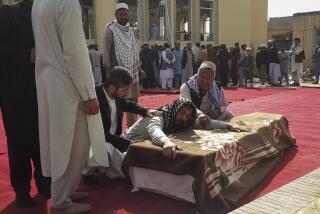Libya rebel council may include extremists, Panetta says
- Share via
Reporting from Washington — President Obama’s nominee for secretary of Defense, Leon Panetta, told the Senate that he is concerned that some leaders of Libya’s opposition may be extremists, even as officials disclosed that U.S. aid for those fighting Moammar Kadafi will fall far short of what the rebel group says it needs.
Panetta, currently the CIA director, told lawmakers during his confirmation hearing Thursday that worries about some members of the rebels’ ruling body, the Transitional National Council, are “legitimate” and that U.S. officials are “watching very closely.”
Panetta was given a friendly reception in the one-day hearing, and his confirmation by the full Senate appears assured.
At a foreign ministers meeting in Abu Dhabi, United Arab Emirates, of nations fighting Kadafi’s regime, Secretary of State Hillary Rodham Clinton said the United States would give $26 million in humanitarian relief for Libya, bringing total U.S. aid to $81 million.
Other countries, including Italy, France, Australia and Turkey, also made pledges of aid at the conference totaling $1.1 billion.
But legal hurdles must be cleared before the money can be delivered. And the total is far less than the $3 billion the rebels have said they need to run a government and wage war for even a few months.
The rebel council’s finance chief, Ali Tarhouni, said outside the meeting that supportive governments have been promising aid since the armed uprising erupted in February, but that “it’s been almost four months now and nothing has materialized,” the Associated Press reported.
Panetta’s concern about the rebel council reflects ambivalence in the Obama administration. Senior officials have praised the group’s motives and goals, now referring to it as “the legitimate interlocutor for the Libyan people,” though not a government.
Yet U.S. officials also continued to voice uncertainties about the group’s membership and its ability to govern. They have moved cautiously in providing money to support it.
Clinton told reporters that the combination of daily airstrikes and stiff economic sanctions is grinding down Kadafi’s regime. She said people close to Kadafi have had “numerous and continuing discussions” with foreign diplomats about arranging a transition to a new government, though there is “not any clear way forward yet.”
She said defections had cost Kadafi two foreign ministers, an interior minister, ambassadors to the United Nations and the United States, an oil minister, five generals “and, just this week, his labor minister defected as well.”
More to Read
Sign up for Essential California
The most important California stories and recommendations in your inbox every morning.
You may occasionally receive promotional content from the Los Angeles Times.














